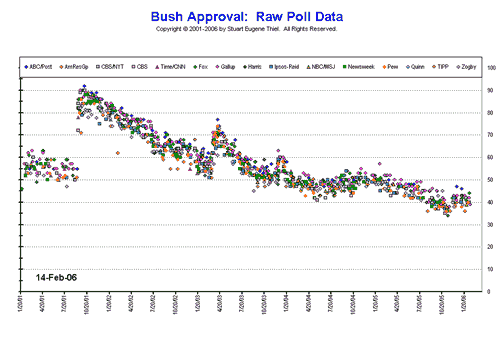Reading George Will’s column in the Washington Post, a funny thing happened. I found myself agreeing with him. He writes in response to a survey:
A survey by the Pew Research Center shows that conservatives are happier than liberals — in all income groups. While 34 percent of all Americans call themselves “very happy,” only 28 percent of liberal Democrats (and 31 percent of moderate or conservative Democrats) do, compared with 47 percent of conservative Republicans. This finding is niftily self-reinforcing: It depresses liberals.
I don’t have trouble believing this. Liberal Democrats have to deal with reality as it is, not as they wish it to be. Not to mention that, and here I speak from personal experience, having to sit through a State of the Union address that actually mentioned the urgent problem of human animal hybrids did not make me particularly happy. In other words, I don’t see a huge amount in the world to be happy about. I would call this perceptiveness. Will, however, has a slightly different theory:
Conservatives are happier than liberals because they are more pessimistic. . . . Conservatives understand that society in its complexity resembles a giant Calder mobile — touch it here and things jiggle there, and there, and way over there. Hence conservatives acknowledge the Law of Unintended Consequences, which is: The unintended consequences of bold government undertakings are apt to be larger than, and contrary to, the intended ones.
Watch carefully. Will’s argument could be restated as:
- Conservatives acknowledge that things are very complicated
- This complexity means that it’s awfully hard to tell what results will obtain from a given action
- Therefore, big government is bad
While this argument is delightfully old-school conservative (never touch the machine! Who knows what might happen!), I don’t think it actually makes any logical sense. Luckily, Will clarifies his statement in the next graf:
Conservatives’ pessimism is conducive to their happiness in three ways. First, they are rarely surprised — they are right more often than not about the course of events. Second, when they are wrong, they are happy to be so. Third, because pessimistic conservatives put not their faith in princes — government — they accept that happiness is a function of fending for oneself. They believe that happiness is an activity — it is inseparable from the pursuit of happiness.
But George, I thought it was hard to tell what the results of things were going to be? How, then, are Conservatives “right more often” than they are wrong? That’s only true if you assume they are making some vague, non-predictive guess, like, “the outcome of Medicare Part D is likely to be complicated.” Well, duh. I’m not sure that’s “right” in any meaningful way.
Will has discovered something that I’ve mentioned before though: Conservatives need not be bound by evidence. Will’s argument here is that Conservatives are happier because they’ve decided that it’s impossible to enact meaningful, positive change in the world. Barring that, they pursue happiness in the self-serving, small-minded way that remains–by enjoying luxuries and advancing their own personal standing in the world. He concludes with a list of the things that Liberals fail to enjoy, assumedly implying that Conservatives are happier because they can derive pleasure from immediate sources while pretending that the larger system in which they operate is so complex that it is pointless to wonder about any impact upon it:
But, then, conscientious liberals cannot enjoy automobiles because there is global warming to worry about, and the perils of corporate-driven consumerism, which is the handmaiden of bourgeoisie materialism. And high-powered cars (how many liberals drive Corvettes?) are metaphors (for America’s reckless foreign policy, for machismo rampant, etc.). And then there is — was — all that rustic beauty paved over for highways. (And for those giant parking lots at exurban mega-churches. The less said about them the better.) And automobiles discourage the egalitarian enjoyment of mass transit. And automobiles, by facilitating suburban sprawl, deny sprawl’s victims — that word must make an appearance in liberal laments; and lament is what liberals do — the uplifting communitarian experience of high-density living. And automobiles . . .
I mean, all of that is true, but Liberals worry about those things because those things are worth worrying about! We all live on Earth, after all, and the health of our planet has been declining lately.
Will’s column is a mirror for my own thoughts. In his mind, being happy justifies what you do, which is an ironic twist on the old chestnut they’re always tossing at liberals: that we promote a do-what-feels-good mentality. What other way can we read Will’s column? He concludes with a clever
You see? Liberalism is a complicated and exacting, not to say grim and scolding, creed. And not one conducive to happiness.
Sure. But being happy doesn’t make you right, and being clever doesn’t either. I’ll take an ideology that acknowledges the challenges we face, and that requires us to search for solutions, over an ideology that obviates any need to do so because doing so would be complicated.




